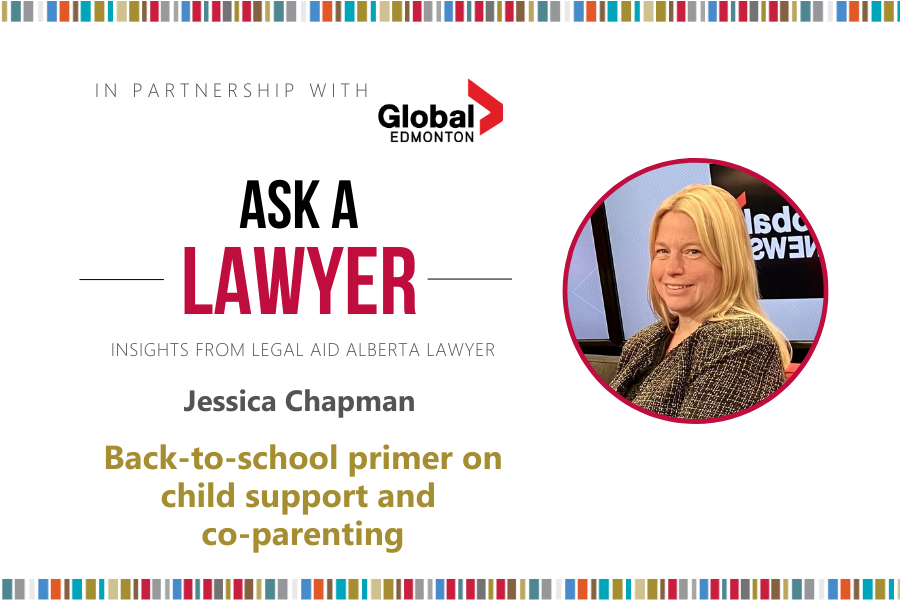It’s time for families who are co-parenting to prepare for fall and the coming school year.
Co-parenting can be a challenge at the best of times. But when a new school season is approaching, parents are faced with a flood of expenses. In addition to school registration fees, kids need new clothes. On top of that, fall is the time of year when registration fees for extra-curricular activities kids are interested in are due. And only a couple of months later, it’s time for winter clothing.
On this month’s installment of Ask A Lawyer, Legal Aid Alberta staff lawyer Jessica Chapman reviews best practices for co-parents to consider.
View the Ask A Lawyer segment:
Transcript of program:
Vinesh Pratap: With the summer holiday season in the home stretch, it’s time for families who are co-parenting to prepare for fall and the coming school year. Here to give us a back-to-school primer on child support in the back-to-school season is Legal Aid Alberta staff lawyer Jessica Chapman. Jessica good morning – how are you?
Jessica Chapman: Good! Thank you for having me.
Vinesh: So, this is always a complicated time for co-parenting, this time of year. Many families feel financial pressure in August while they shop for school supplies and a new wardrobe – things like that. Talk to us about you know, support payments, and how it all factors in there.
Jessica: Generally, when you get to back-to-school times child support doesn’t change. Those kind of costs – wardrobe, school supplies and basic school fees are supposed to be built into the base amount of child support. But it is a really expensive time of year and many of the extracurricular activities that kids are in, their registration fees are due right now. And kids grow and so you have to like, plan for all these seasons and have all the things they need. Most people don’t typically set aside money each month in some sort of clothing account and so my main message to people is if you can help out with those costs and help the other patent even if you are not legally required to do it, think of your kids they are the ones going back to school and obviously kids can’t have everything they want, but if you can get them the things they need you are helping to set them up for success.
Vinesh: Yeah definitely. And the last thing a kid needs to worry about is what the parents are doing. Let’s go through this transition time because a lot of kids are going from17 to 18, so they’re officially becoming adults, and how does that work when it comes to child support, especially if they want to go into post-secondary?
Jessica: So child support doesn’t necessarily end when a child turns 18. There are 18-year-olds who are still finishing high school, so child support would still continue in that situation. When it comes to child support for adult children there are a lot of factors come into play and there has to be discussion so I would encourage people to try something like mediation and try and work that out, and you may have to involve your adult child in it because you have to look at what they can contribute. Are they able to work full-time or part-time? Are they going to school full-time? How many hours will the program take? What are they able to contribute? Could they apply for student loans, scholarships, bursaries? I’ve heard stats on scholarships, and it seems that there’s a lot of them that don’t get awarded simply because people don’t apply. It is really worth looking into.
Vinesh: Really important resource, definitely do your homework. What about if a parent was to go back to school? How does that work from a financial situation?
Jessica: That can create a lot of financial pressure on a family. Even though you are divorced, you are still sort of economically linked. The reasons for going back to school are important, and what kind of opportunities are going to exist afterwards. Again, I would encourage families to try to work together. Bursaries, scholarships, all of those things have to be looked at. Just because one parent wants to go back to school doesn’t mean the children stop needing things. Even if you are going back to school, you have to be able to do your part to support the kids.
Vinesh: I guess finally, this might be a bit of a tricky one, a child spends more time with a parent during the summer and decides “I want to move in with that parent.” How do families deal with situations like that?
Jessica: That is pretty complicated. Children get to have a voice, but it’s not necessarily their choice. I think the adults need to be making the choices for the children. My advice would be don’t panic. Let’s find out what the underlying reasons are behind the wish. Look at what the child needs. Most of the time it is not going to be a good idea for children to uproot their schooling. But you could have a situation where a child is simply a need of a fresh start depending on their peer group and that sort of thing. So again, I would suggest try mediation before ever heading to court or getting into battles because chances are when it comes to kids you both want the best for your kids and you will find that you have more in common than you don’t.
Vinesh: Let’s hope so. Jessica, thanks for coming in for this back-to-school lesson.
Jessica: Thank you.


